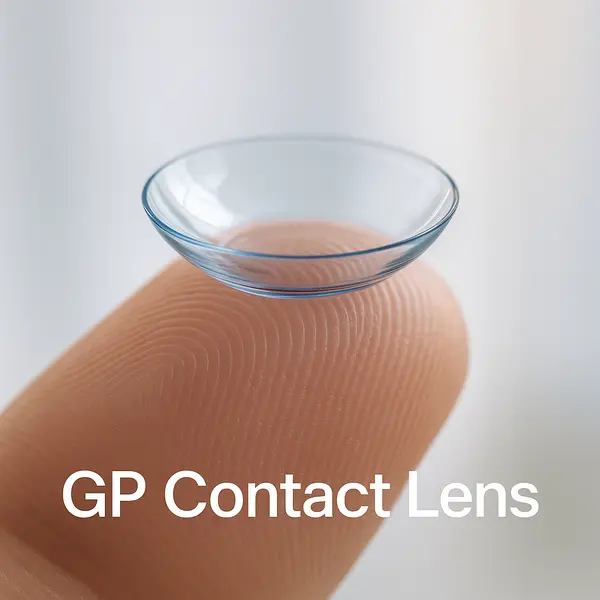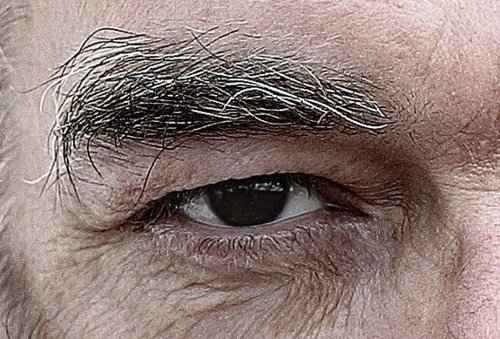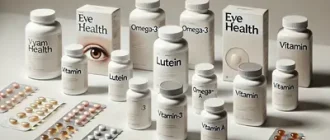Gas permeable (GP) contact lenses—also known as RGP or hard lenses—are rigid lenses that allow oxygen to pass through to the cornea. Unlike soft lenses, which conform to the shape of the eye, GP lenses retain their shape, providing crisper vision and better correction for certain eye conditions.
Safe Continuous Wear Days Without Complications
The chart displays the number of safe continuous wear days without complications for different types of contact lenses. Scleral GP lenses lead significantly with 22 days, followed by hybrid lenses at 18 days, and soft lenses lagging at only 7 days.
Made from durable plastics like fluorosilicone acrylate, GP lenses are about 0.1 inches (2.5 mm) smaller in diameter than the cornea and typically measure 0.35 inches (9 mm) across. They can correct a broader range of vision problems than soft lenses, including high astigmatism and keratoconus (Contact Lens Spectrum).
How Do They Work?
Because they’re firm, GP lenses maintain a consistent optical surface, which enhances vision clarity. Imagine trying to watch a movie on a wrinkled projector screen—that’s what your vision might be like with an irregular cornea. GP lenses act like a flat, high-quality screen that smooths out those imperfections so the image is clear.

They “float” on a thin layer of tears between the lens and the eye, creating a cushion. Think of it like a small boat resting on a calm lake—the tears help keep the lens stable and comfortable. Plus, the lens allows oxygen to pass through to the cornea, which is essential since the cornea doesn’t have its own blood supply. It’s kind of like your eye “breathing” through the lens (All About Vision).
This oxygen flow helps keep your eyes healthy and reduces the risk of problems like dryness or redness. Even someone who’s never worn contacts before can appreciate how a lens that “lets your eye breathe” is going to feel better throughout the day—whether you’re a 15-year-old gaming after school or a 65-year-old reading the newspaper over breakfast.
Why Choose Gas Permeable Lenses?
Here’s where GP lenses shine:
- Superior Vision Quality: They offer sharper vision compared to soft lenses. For example, patients with astigmatism often report a noticeable increase in clarity, especially when driving at night or reading fine print.
- Durability: With proper care, a single pair can last 1–2 years. That’s significantly longer than soft lenses, which typically require replacement every 1–3 months—making GP lenses a smart long-term investment.
- Cost-Effective: Despite higher upfront costs (about $100–$300 per lens), they last longer, reducing replacement frequency and overall expense over time. In contrast, a year’s supply of daily disposable soft lenses can cost upwards of $500–$700.
- Better Eye Health: High oxygen permeability helps maintain corneal health and reduce the risk of complications like corneal neovascularization. According to the American Optometric Association, GP lenses significantly lower the incidence of corneal swelling compared to soft lenses.
One caveat: they require an adaptation period of 1–2 weeks, which can be a deal-breaker for some. But once your eyes adjust, users often say the clarity is worth the initial discomfort—“like going from a blurry webcam to 4K.”
Oxygen Permeability Score (Dk/t – Higher is Better)
The chart illustrates the oxygen permeability score (Dk/t) of various contact lenses. GP lenses show the highest permeability at 120, making them the most breathable option. Hybrid lenses follow with 85, while soft hydrogel lenses provide the lowest oxygen flow at 35.
Who Benefits Most?
GP lenses are often recommended for:
- People with high astigmatism or irregular corneas: These conditions distort vision because of uneven curvature. GP lenses provide a smooth refracting surface that overrides the eye’s irregularities. Patients often describe a sudden jump in clarity—similar to upgrading from standard to HD.
- Patients with keratoconus: This progressive thinning and bulging of the cornea makes soft lenses ineffective. GP or scleral lenses vault over the cone-shaped cornea, reducing visual distortion and dramatically improving comfort. Users often experience less glare and halos, especially at night.
- Individuals post-LASIK surgery: Some post-surgical corneas develop irregular shapes. GP lenses offer the stability and sharp optics needed to counteract those changes, leading to more predictable and consistent vision correction.
- Contact lens wearers who need multifocal or monovision correction: GP multifocal designs provide crisp near and distance vision in one lens, with less fluctuation compared to soft multifocals. Many users appreciate the steady focus and say it feels more natural when reading or switching between screens and real life.
In all these cases, GP lenses do more than just correct vision—they enhance the quality of daily visual experience. Users often report reduced eye strain, improved contrast sensitivity, and even fewer headaches from eye fatigue (Optometry and Vision Science Journal).
Case in point: A 34-year-old male from Phoenix, AZ with keratoconus reported improved visual acuity from 20/80 to 20/25 after switching to scleral GP lenses.
Modern Advances in GP Lens Technology
Innovation has stepped up the GP game. Brands like Paragon Vision Sciences, BostonSight, and Blanchard now offer:
- Scleral Lenses: These lenses are much larger (up to 0.79 inches/20 mm) and vault entirely over the cornea, landing on the sclera (the white part of the eye). This design creates a fluid reservoir between the lens and cornea, which provides continuous hydration and exceptional comfort. They’re ideal for people with severe dry eye, advanced keratoconus, or corneal irregularities. Think of them as the off-road vehicles of contact lenses—rugged, stable, and built for tough terrain (Scleral Lens Education Society).
- Hybrid Lenses: These combine the optical clarity of a GP center with the comfort of a soft lens skirt. It’s the best of both worlds—like having a high-definition lens encased in a memory foam pillow. They’re particularly suitable for patients who have struggled with GP comfort but don’t want to sacrifice visual acuity. Great for individuals with mild corneal irregularities, early keratoconus, or who need multifocal correction (Visionary Optics).
- Wavefront-Guided Designs: Custom-built based on the unique optical fingerprint of your eye, these lenses are made using advanced aberrometry to minimize visual distortions. They’re precision-tuned like a race car for your vision, and especially beneficial for patients with irregular astigmatism or post-surgical corneas. They provide unparalleled sharpness, particularly in low-light or nighttime conditions (Review of Myopia Management).
These innovations aren’t just bells and whistles—they solve real problems. Whether it’s increasing comfort, improving visual clarity, or expanding wearability, modern GP designs offer tailored solutions that suit a wide range of patients.
Diagnostic Tools and Fitting Process
Fitting GP lenses is a bit of an art form. Here’s how it works:
| Method | Description | Accuracy (1–10) | Average Cost (USD) |
|---|---|---|---|
| Manual Keratometry | Measures corneal curvature using a keratometer | 7 | $40–$100 |
| Corneal Topography | Maps the entire corneal surface digitally | 9 | $100–$250 |
| Optical Coherence Tomography (OCT) | Cross-sectional imaging of the cornea and tear film | 10 | $150–$300 |
| Slit Lamp Exam | Evaluates lens fit and eye health under magnification | 8 | Included in eye exam |
Eye care specialists may use trial lenses and fluorescein dye to optimize the fit, ensuring proper centration and movement (National Eye Institute).
What About Comfort?
Let’s be real—GP lenses take some getting used to. The first few days might feel like you’ve got a tiny plate in your eye. But with consistent wear (ideally 4–6 hours daily at first), most users adapt within two weeks.
Adaptation Success Rate (Higher is Better)
This chart compares the adaptation success rates of various lens types. Soft lenses are the easiest to adapt to with a 98% success rate, followed by hybrid lenses at 92%, and GP lenses at 87%.
Soft lens users might balk at the initial sensation, but the tradeoff is top-notch vision. And modern materials and lens coatings are making GP lenses more comfortable than ever.
Care and Maintenance
Caring for GP lenses is easy once you’re in the groove. Daily cleaning with a surfactant cleaner, rinsing with saline, and overnight soaking in a disinfecting solution are the norm.
Avoid tap water—it can introduce harmful microorganisms like Acanthamoeba (CDC). Brands like Boston Advance, Clear Care, and Unique pH offer comprehensive care systems.
Can They Be Worn Full-Time?
Absolutely. After the adaptation period, many users wear them 10–14 hours a day. In fact, GP lenses are often recommended for extended daily use because they help maintain corneal shape and reduce the risk of hypoxia.
That said, full-time wear may not be ideal for everyone. Individuals with especially dry eyes, those prone to inflammation, or people who work in dusty or windy environments may find GP lenses uncomfortable for prolonged periods. In such cases, hybrid or scleral lenses might be a better option.
Full-time wear is especially suitable for patients with stable ocular surfaces and healthy tear film production. It’s also common among professionals who require precise vision—like graphic designers, photographers, and surgeons.
Consistency is key: wearing them daily helps the eyes adapt better and ensures optimal comfort. However, regular follow-ups with an eye care provider are crucial to monitor corneal health and lens performance.
Editorial Advice
Gas permeable contact lenses aren’t for everyone, but they’re a game-changer for those who need precision correction. If your soft lenses aren’t cutting it, GP might be the upgrade you didn’t know you needed.
Reyus Mammadli, medical consultant, recommends: “If you’ve struggled with blurry vision or irregular corneal shape, ask your eye doctor about GP or scleral lenses. They offer unparalleled optical quality and long-term eye health benefits.”
Here’s a tip: give them a real shot. Stick with them through the adaptation period and use modern fitting technologies. Your eyes—and your vision—will thank you.
Pro Tip: If you’re investing in high-end lenses, also invest in a top-tier fitting from a certified specialist. It makes all the difference.



